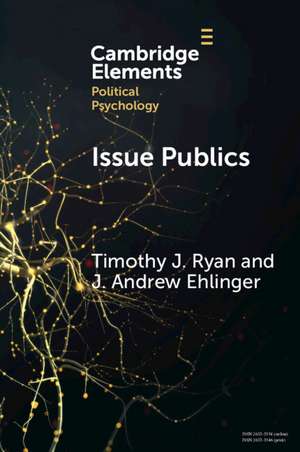Issue Publics: How Electoral Constituencies Hide in Plain Sight: Elements in Political Psychology
Autor Timothy J. Ryan, J Andrew Ehlingeren Limba Engleză Paperback – 10 mai 2023
Preț: 129.51 lei
Nou
Puncte Express: 194
Preț estimativ în valută:
24.79€ • 25.78$ • 20.46£
24.79€ • 25.78$ • 20.46£
Carte disponibilă
Livrare economică 25 martie-08 aprilie
Livrare express 08-14 martie pentru 15.06 lei
Preluare comenzi: 021 569.72.76
Specificații
ISBN-13: 9781009242417
ISBN-10: 1009242415
Pagini: 75
Dimensiuni: 152 x 229 x 5 mm
Greutate: 0.13 kg
Editura: Cambridge University Press
Colecția Cambridge University Press
Seria Elements in Political Psychology
Locul publicării:Cambridge, United Kingdom
ISBN-10: 1009242415
Pagini: 75
Dimensiuni: 152 x 229 x 5 mm
Greutate: 0.13 kg
Editura: Cambridge University Press
Colecția Cambridge University Press
Seria Elements in Political Psychology
Locul publicării:Cambridge, United Kingdom
Cuprins
1. Eldon Gould's Particular Problem; 2. A Hostile Landscape for Issue Voting; 3. Issues of Measurement; 4. A New Approach; 5. Voting on Issues; 6. The Hidden Significance of Issues; Appendix A: Sample Characteristics; Appendix B: Conjoint Attributes and Levels; Appendix C: Vote Choice Models; Appendix D: Procedure to Remove Fraudulent Responses from MTurk Study; Appendix E: Full Conjoint Results.
Descriere
This Element uses new techniques to challenge the conventional wisdom that Americans rarely vote on the basis of issue opinions.

